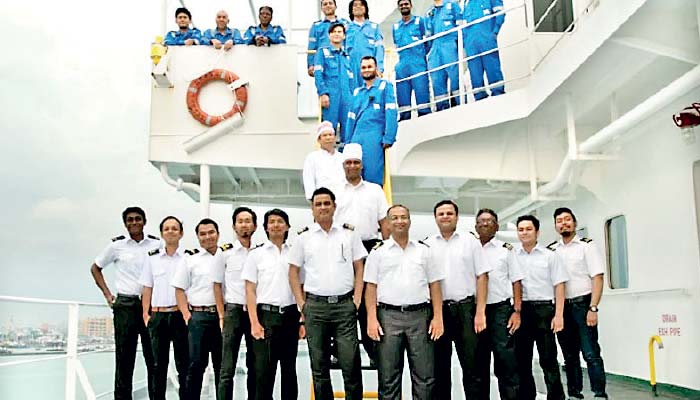Tuesday Feb 17, 2026
Tuesday Feb 17, 2026
Monday, 1 September 2025 03:56 - - {{hitsCtrl.values.hits}}

Sri Lanka’s crewing industry is undergoing a transformative revival, with ambitious plans to increase its seafarer workforce from 16,000 to 50,000 and grow the sector’s economic contribution from $ 400 million to $ 1.5 billion within the next five years. Spearheading this movement is the Ceylon Association of Shipping Agents (CASA), the apex body of the country’s maritime and logistics industry, now actively leading efforts to institutionalise crewing as a national priority.
While historically overshadowed by port and infrastructure matters, the crewing sector gained new momentum in 2022 when CASA was a key stakeholder driving this bold step of initiating a comprehensive study that eventually culminated in a national policy framework. This policy, developed over the course of a year with key industry stakeholders, outlines six core objectives that address growth, global branding, regulation, and international cooperation.
The six strategic objectives are:
CASA’s re-emerging leadership
CASA has emerged as the principal driver of this industry shift. For years, the crewing industry was sustained solely by private sector actors with little government visibility. However, following the country’s recent economic downturn — which triggered a national search for new foreign exchange sources — crewing found a renewed sense of purpose.
Recognising this, CASA revitalised its internal efforts in this domain. The industry had even formed a parallel body, the Association of Seafarer Recruiting Agents (ASRA), to keep advocacy efforts alive during CASA’s quieter phase. But under new leadership, CASA re-engaged by forming a dedicated committee focused on crewing. Their efforts now span advocacy, MoUs, regulatory challenges, and the promotion of welfare initiatives.
CASA has intervened in immigration bottlenecks, tackled seafarer taxation anomalies, and brokered SOP reforms with the Merchant Shipping Secretariat. For instance, the Social Welfare Contribution System, which was nearly unworkable, was revised through our intervention. It’s now active from 1 May.
Tackling certification and flag barriers
A recurring challenge is the non-recognition of Sri Lankan Certificates of Competency (CoCs) by key ship-owning nations such as Turkey and the Netherlands. This prevents local seafarers from serving on vessels under those flags.
In response, CASA has adopted a proactive diplomatic approach: aligning the Directorate General of Merchant Shipping, the Foreign Ministry, Sri Lankan embassies abroad, and foreign embassies locally to negotiate mutual recognition agreements. An MoU with the Netherlands has already been finalised, and discussions with Turkey and South Korea are underway.
This is about connecting the dots — commercial requirements, diplomatic channels, and regulatory frameworks — to create access for Sri Lankan talent.
Advocacy, wellbeing and inclusion
Beyond growth metrics, CASA has taken an active role in promoting seafarer welfare and health. They collaborate with the Anti-Malaria Campaign to educate seafarers on disease prevention, especially in high-risk regions. They also lobby for practical and implementable Standard Operating Procedures (SOPs) related to safety and benefits.
The association is equally vocal about addressing the tax treatment of Sri Lankan seafarers working on coastal ships. Current policies impose taxes on those spending more than 183 days locally — a situation CASA is urgently addressing with relevant ministries.
Moreover, CASA is a proud endorsement partner of the “She Can Sail the Seas” initiative, aimed at increasing the number of female cadets in the industry. Aligning with SDG goals and national priorities on gender inclusion, this initiative underscores the growing importance of diversity in maritime employment.
Global roadshows and diplomatic engagement
CASA plans to launch industry roadshows in countries such as South Korea, Turkey, Japan, and the Netherlands, with the aim of promoting Sri Lanka as a premium crewing hub. These efforts are designed not only to attract international shipowners but also to showcase the country’s regulatory readiness and workforce quality.
The association strongly advocates for Sri Lankan trade desks and diplomatic missions abroad to include maritime industry objectives in their mandates. If each embassy and high commission understood and carried this mission, Sri Lanka would be top-of-mind when shipowners think of talent.
From policy to practice
The national marine policy, now in its final stages of public review, is expected to be tabled for Cabinet approval soon. Once institutionalised, it would provide the formal framework necessary to embed crewing targets into national budgets, foreign trade strategies, and diplomatic outreach.
“We’ve done the work — why reinvent the wheel? The Government recognises that, and there is strong bipartisan support. Now, it’s about swift adoption and execution,” said the official.
With over five decades of institutional memory and sector-wide representation, CASA is positioning itself not just as an industry association but as a policy catalyst, diplomatic facilitator, and think tank.
Surmise it to say, Sri Lanka’s crewing sector is no longer in the shadows. Thanks to strategic leadership, coordinated advocacy, and a clear national roadmap, it is on the cusp of becoming a major foreign exchange earner and a symbol of Sri Lankan excellence on the global stage.
As global shipping evolves and demand for skilled manpower grows, Sri Lanka is poised to meet that demand — not just with numbers, but with quality, credibility, and commitment.